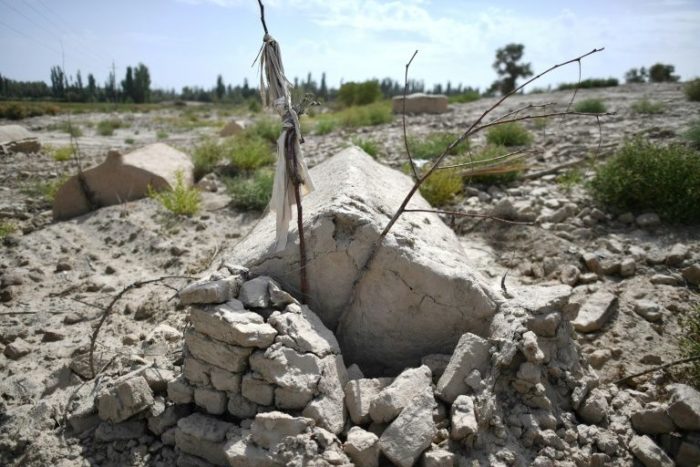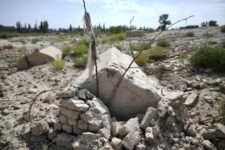Even in death, Uighurs feel long reach of Chinese state

AFP, 9 October 2019

AFP – China is destroying burial grounds where generations of Uighur families have been laid to rest, leaving behind human bones and broken tombs in what activists call an effort to eradicate the ethnic group’s identity in Xinjiang.
In just two years, dozens of cemeteries have been destroyed in the northwest region, according to an AFP investigation with satellite imagery analysts Earthrise Alliance.
Some of the graves were cleared with little care — in Shayar county, AFP journalists saw unearthed human bones left discarded in three sites. In other sites tombs that were reduced to mounds of bricks lay scattered in cleared tracts of land.
While the official explanation ranges from urban development to the “standardisation” of old graves, overseas Uighurs say the destruction is part of a state crackdown to control every element of their lives.
“This is all part of China’s campaign to effectively eradicate any evidence of who we are, to effectively make us like the Han Chinese,” said Salih Hudayar, who said the graveyard where his great-grandparents were buried was demolished.
“That’s why they’re destroying all of these historical sites, these cemeteries, to disconnect us from our history, from our fathers and our ancestors,” he said.
An estimated one million mostly Muslim ethnic minorities have been rounded up into re-education camps in Xinjiang in the name of combatting religious extremism and separatism.
Those who are free are subject to rigorous surveillance and restrictions — from home visits from officials to bans on beards and veils.
China has remained defiant despite escalating global criticism of its treatment of Uighurs. This week, the United States said it would curb visas for officials over the alleged abuses and blacklisted 28 Chinese firms it accuses of rights violations.
– ‘Religious persecution’ –
According to satellite imagery analysed by AFP and Earthrise Alliance, the Chinese government has, since 2014, exhumed and flattened at least 45 Uighur cemeteries — including 30 in the past two years.
The Xinjiang government did not respond to a request for comment.
The destruction is “not just about religious persecution,” said Nurgul Sawut, who has five generations of family buried in Yengisar, southwestern Xinjiang.
“It is much deeper than that,” said Sawut, who now lives in Australia and last visited Xinjiang in 2016 to attend her father’s funeral.
“If you destroy that cemetery … you’re uprooting whoever’s on that land, whoever’s connected to that land,” she explained.
Even sites featuring shrines or the tombs of famous individuals were not spared.
In Aksu, local authorities turned an enormous graveyard where prominent Uighur poet Lutpulla Mutellip was buried into “Happiness Park,” with fake pandas, a children’s ride, and a man-made lake.
Mutellip’s grave was like “a modern day shrine for most nationalist Uighurs, patriotic Uighurs,” recalled Ilshat Kokbore, who visited the tomb in the early 90s and now resides in the US.
The “Happiness Park” project saw graves moved to a new cemetery in an industrial zone out in the desert. The caretaker there said he had no knowledge of the fate of Mutellip’s remains.
The Aksu government could not be reached for comment.
– Destroying history –
In China, urban growth and economic development has laid waste to innumerable cultural and historic sites, from traditional hutong neighbourhoods in Beijing to segments of Dali’s ancient city wall in southwestern Yunnan province. It is an issue Beijing itself has acknowledged.
The government has also been criticised for its irreverence towards burial traditions outside of Xinjiang, including the destruction of coffins in central Jiangxi last year to force locals to cremate.
But activists and scholars say the clearances are especially egregious in Xinjiang, where they parallel the erasure of other cultural and spiritual sites — including at least 30 mosques and religious sites since 2017, an AFP investigation found in June.
“The destruction of the graveyards is very much part of the wider raft of policies that are going on,” said Rachel Harris, who researches Uighur culture at the School of Oriental and African Studies University of London.
“From the destruction of holy shrines, the tombs of saints, to the destruction of tombs of families, all of this is disrupting the relationship between people and their history, and the relationship between the people and the land that they live on,” she said.
https://www.afp.com/en/news/15/even-death-uighurs-feel-long-reach-chinese-state-doc-1ky71r3

